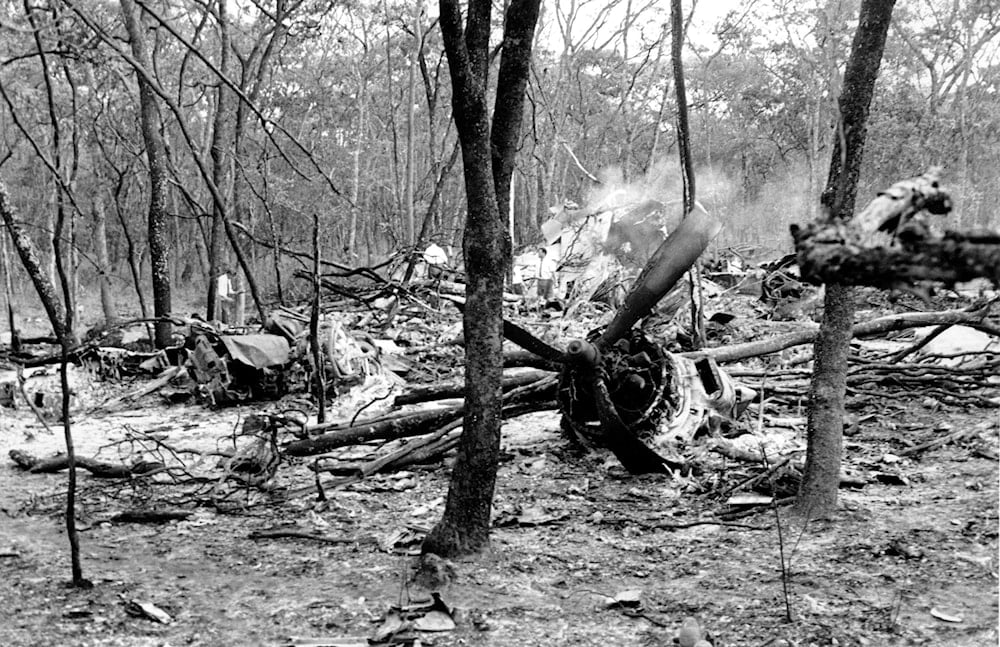US, UK accused of obstructing investigation into 1961 UN chief's death
The United States and the United Kingdom are accused of obstructing the probe into the plane crash that killed UN Secretary-General Dag Hammarskjöld in 1961.
-

In this September 19, 1961, file photo, searchers walk through the scattered wreckage of a DC6B plane in a forest near Ndola, Zambia (AP)
University researchers have accused the United States and the United Kingdom of obstructing a United Nations inquiry into the 1961 plane crash that claimed the life of UN Secretary-General Dag Hammarskjöld.
During a conference in London, participants received an update from UN Assistant Secretary-General for Legal Affairs, Stephen Mathias, regarding the progress of the ongoing inquiry. The investigation is focused on acquiring critical archive documentation from member states.
The US and UK were heavily criticized amid accusations that they had been purposefully delaying the provision of potentially vital information, hindering the investigation into Hammarskjöld's tragic demise.
Hammarskjöld, a Swedish diplomat, lost his life on September 18, 1961, while en route to negotiate a ceasefire between UN peacekeepers in the Congo and separatists from the breakaway Congolese region of Katanga. The crash of his Douglas DC-6 airliner near Ndola, Northern Rhodesia (now Zambia), claimed the lives of Hammarskjöld and 15 other passengers.
Presence of Belgian pilots, US-French-British intelligence suspected
The initial inquiry conducted by Rhodesian authorities attributed the crash to pilot error, which was met with controversy. Witnesses on the ground reported seeing another plane and flashes in the sky.
Reports suggested the presence of Belgian mercenary pilots, along with French and British intelligence officers. US intelligence officers were allegedly monitoring communications from Cyprus, detecting signals consistent with the UN plane potentially coming under fire.
In 2017, the UN reopened the case under Mohamed Chande Othman, a Tanzanian judge, who advocated for the appointment of independent officials to oversee the examination of archives in countries possessing relevant information.
Watch | Secret document reveals new details related to the murder of #UN Secretary-General Dag Hammarskjöld in 1961. pic.twitter.com/COm5UOizHF
— Al Mayadeen English (@MayadeenEnglish) April 16, 2022
Organizers of Thursday's conference, the Institute of Commonwealth Studies at the University of London and the Westminster United Nations Association, expressed disappointment with the responses of the US and the UK, labeling them "wholly inadequate" and indicative of contempt for the UN inquiry.
Susan Williams, a researcher whose 2011 book "Who Killed Hammarskjöld" contributed to the reopening of the UN inquiry, emphasized that the US and UK were "global outliers." She pointed out that the most recent UN General Assembly resolution renewing the investigation was co-sponsored by 142 out of 193 member states, but notably excluded support from the US and the UK.
Paul Boateng, the former UK High Commissioner to South Africa, stressed the importance of continuing the investigation, asserting, "The suspected murder of a UN Secretary-General is a crime too grave to be obliterated by time," emphasizing the need for unwavering commitment to uncovering the truth amidst increasing threats to democracy, the international rule of law, and the UN.

 3 Min Read
3 Min Read








